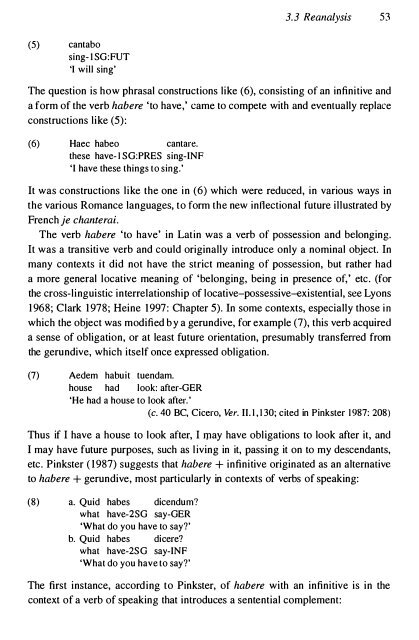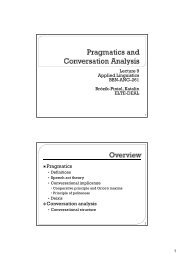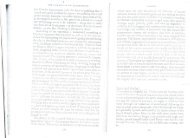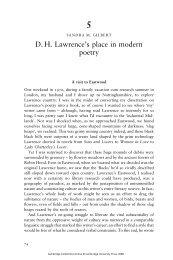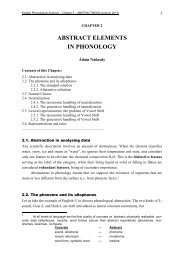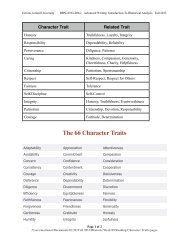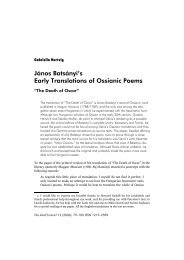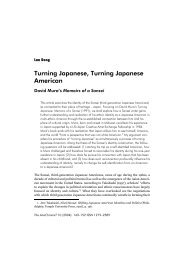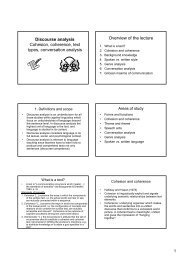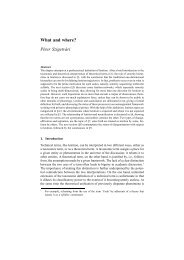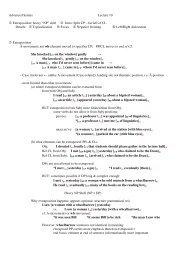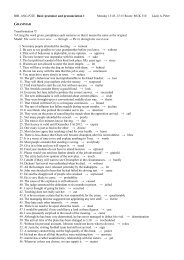- Page 2 and 3:
Grammaticalization Second Edition T
- Page 4 and 5:
Grammaticalization Second Edition P
- Page 6 and 7:
In memory of Dwight Bolinger 1907-1
- Page 8 and 9:
x Contents 3.3 Reanalysis 50 :'1.3.
- Page 10 and 11:
XII Contents 8.3 Implications of pi
- Page 12 and 13:
Tables ::1.1 Grammaticalization of
- Page 14 and 15:
xvi Preface and acknowledgments gra
- Page 16 and 17:
Abbreviations Linguistic terms ABL
- Page 18 and 19:
xx Abbreviations Srel relative clau
- Page 20 and 21: 2 I Some preliminaries recurring co
- Page 22 and 23: 4 J Some preliminaries 1.2 What is
- Page 24 and 25: 6 J Some preliminaries relationship
- Page 26 and 27: 8 I Some preliminaries tendencies.
- Page 28 and 29: 10 J Some preliminaries 1.3. 1 Lets
- Page 30 and 31: 12 J Some preliminaries form of us.
- Page 32 and 33: 14 I Some preLiminaries (23) Me-gbb
- Page 34 and 35: 16 1 Some preliminaries 1.4 Grammat
- Page 36 and 37: 18 I Some preliminaries same way. F
- Page 38 and 39: 20 2 The history of grammaticalizat
- Page 40 and 41: 22 2 The history of grammaticalizat
- Page 42 and 43: 24 2 The history of grammaticalizat
- Page 44 and 45: 26 2 The histOlY of gramm atica liz
- Page 46 and 47: 28 2 The history of grammaticalizat
- Page 48 and 49: 30 2 The histOlY of grammaticalizat
- Page 50 and 51: 32 2 The history of grammaticalizat
- Page 52 and 53: 34 2 The history of grammaticalizat
- Page 54 and 55: 36 2 The history ojgrammaticalizati
- Page 56 and 57: 38 2 Th e history of grammaticaliza
- Page 58 and 59: 40 3 Mechanisms: reanalysis and ana
- Page 60 and 61: 42 3 Mechanisms: reanalysis and ana
- Page 62 and 63: 44 3 Mechanisms: reanalysis and ana
- Page 64 and 65: 46 3 Mechanisms: reanalysis and ana
- Page 66 and 67: 48 3 Mechanisms: reanaLysis and ana
- Page 68 and 69: 50 3 Mechanisms: reanalysis and all
- Page 72 and 73: 54 3 Mechanisms: reanalysis and ana
- Page 74 and 75: 56 3 Mechanisms: reanalysis and ana
- Page 76 and 77: 58 3 Mechanisms: reanalysis and ana
- Page 78 and 79: 60 3 Mechanisms: reallalysis and an
- Page 80 and 81: 62 3 Mechanisms: reanalysis and ana
- Page 82 and 83: 64 3 Mechanisms: reanalysis and ana
- Page 84 and 85: 66 3 Mechanisms: reanalysis an.d an
- Page 86 and 87: 68 3 Mechanisms: reanalysis and ana
- Page 88 and 89: 70 3 Mechanisms: reanalysis and ana
- Page 90 and 91: 72 4 Pragmatic factors speakers tak
- Page 92 and 93: 74 4 Pragmatic fa ctors based on me
- Page 94 and 95: 76 4 Pragmatic factors (e.g., Traug
- Page 96 and 97: 78 4 Pragmatic fa ctors established
- Page 98 and 99: 80 4 Pragmatic fa ctors Ty pically
- Page 100 and 101: 82 4 Pragmatic fa ctors (1975) in c
- Page 102 and 103: 84 4 Pragmatic factors A second que
- Page 104 and 105: 86 4 Pragmatic fa ctors apply to th
- Page 106 and 107: 88 4 Pragmatic factors the non-ling
- Page 108 and 109: 90 4 Pragmatic factors could no lon
- Page 110 and 111: 92 4 Pragmatic factors relevance of
- Page 112 and 113: 94 4 Pragmatic factors 4.5 Pragmati
- Page 114 and 115: 96 4 Pragmatic/actors Perhaps the m
- Page 116 and 117: 98 4 Pragmatic fa ctors The process
- Page 118 and 119: 100 5 The hypothesis of unidirectio
- Page 120 and 121:
102 5 The hypothesis of unidirectio
- Page 122 and 123:
104 5 The hypothesis of ttllidirect
- Page 124 and 125:
106 5 The hypothesis of unidirectio
- Page 126 and 127:
108 5 The hypothesis of unidirectio
- Page 128 and 129:
110 5 Th e hypothesis of unidirecti
- Page 130 and 131:
112 5 The hypothesis of unidirectio
- Page 132 and 133:
I 14 5 The hypothesis oj unidirecti
- Page 134 and 135:
116 5 The hypothesis of unidirectio
- Page 136 and 137:
118 5 The hypothesis of unidirectio
- Page 138 and 139:
120 5 The hypothesis of unidirectio
- Page 140 and 141:
122 5 The hypothesis of unidirectio
- Page 142 and 143:
124 5 The hypothesis of unidirectio
- Page 144 and 145:
126 5 The hypothesis of unidirectio
- Page 146 and 147:
128 5 The hypothesis of unidirectio
- Page 148 and 149:
130 5 The hypothesis of unidirectio
- Page 150 and 151:
132 5 The hypothesis of unidirectio
- Page 152 and 153:
134 5 The hypothesis of unidirectio
- Page 154 and 155:
136 5 The hypothesis of unidirectio
- Page 156 and 157:
138 5 The hypothesis of unidirectio
- Page 158 and 159:
6 Clau se-internal morphological ch
- Page 160 and 161:
142 6 Clause-internal morphological
- Page 162 and 163:
144 6 Clause-internal morphological
- Page 164 and 165:
146 6 CLause-internaL morphoLogical
- Page 166 and 167:
148 6 Clause-internal morphological
- Page 168 and 169:
150 6 CLause-internaL morphoLogicaL
- Page 170 and 171:
152 6 Clause-internal morphological
- Page 172 and 173:
154 6 CLause-internaL morphoLogicaL
- Page 174 and 175:
156 6 Clause-internal morphological
- Page 176 and 177:
158 6 Clause-internal morphological
- Page 178 and 179:
160 6 Clause-internal morphological
- Page 180 and 181:
162 6 Clause-internal morphological
- Page 182 and 183:
164 6 Clause-internal morphological
- Page 184 and 185:
166 6 CLause-internaL morphoLogicaL
- Page 186 and 187:
168 6 Clause-internal morphological
- Page 188 and 189:
170 6 Clause-internal morphological
- Page 190 and 191:
172 6 Clause-internal morphological
- Page 192 and 193:
174 6 Clause-internal 17lorphologic
- Page 194 and 195:
176 7 Grammaticalization across cla
- Page 196 and 197:
178 7 Grammaticalization across cla
- Page 198 and 199:
180 7 Grammaticalizatioll across cl
- Page 200 and 201:
182 7 Grammaticalization across cla
- Page 202 and 203:
184 7 Grammaticalization across cla
- Page 204 and 205:
186 7 Grammaticalization across cla
- Page 206 and 207:
188 7 Grammaticalization across cla
- Page 208 and 209:
190 7 Grammaticalizatioll across cl
- Page 210 and 211:
192 7 Grammaticalization across cla
- Page 212 and 213:
194 7 Grammaticalization across cla
- Page 214 and 215:
196 7 Grammaticalization across cla
- Page 216 and 217:
198 7 Grammaticalization across cla
- Page 218 and 219:
200 7 Grammaticalization across cla
- Page 220 and 221:
202 7 Grammaticalization across cla
- Page 222 and 223:
204 7 Grammaticalization across cla
- Page 224 and 225:
206 7 Grammaticalization across cla
- Page 226 and 227:
208 7 Grammaticalizatioll across cl
- Page 228 and 229:
210 7 GrammaticaLizatiolZ across cl
- Page 230 and 231:
8 Grammatica lization in situations
- Page 232 and 233:
214 8 Situations of extreme languag
- Page 234 and 235:
216 8 Situations 0/ extreme languag
- Page 236 and 237:
218 8 Situations of extreme languag
- Page 238 and 239:
220 8 Situations of extreme languag
- Page 240 and 241:
222 8 Situations of extreme languag
- Page 242 and 243:
224 8 Situations of extreme Languag
- Page 244 and 245:
226 8 Situations of extreme languag
- Page 246 and 247:
228 8 Situations of extreme languag
- Page 248 and 249:
230 8 Situations of extreme languag
- Page 250 and 251:
232 9 Summary alld suggestions fo r
- Page 252 and 253:
Notes Some preliminaries I. We foll
- Page 254 and 255:
236 Notes to pages 152-226 2. The d
- Page 256 and 257:
238 References the Linguistic Codin
- Page 258 and 259:
240 References Breal, Michel. 1991
- Page 260 and 261:
242 Refe rences Chafe, Wallace L. 1
- Page 262 and 263:
244 References Dietrich, W. 1973. D
- Page 264 and 265:
246 References Genetti, Carol 1991.
- Page 266 and 267:
248 Refe rences Halpern, Aaron. 199
- Page 268 and 269:
250 References Hopper, Paul. 1987.
- Page 270 and 271:
252 References Kemenade, Ans van. I
- Page 272 and 273:
254 References Lambrecht, Knud. 199
- Page 274 and 275:
256 References Los, Beuelou. 1999.
- Page 276 and 277:
258 References Ohori . Toshio, ed.
- Page 278 and 279:
260 References Sankoff, Gillian. 19
- Page 280 and 281:
262 References Ti mberlake. Alan. 1
- Page 282 and 283:
264 References Wi scher, lise, and
- Page 284 and 285:
266 Index a/ names Couper-Kuhlen. E
- Page 286 and 287:
268 Index a/ names Meillet, Antoine
- Page 288 and 289:
Index of languages Akkadian 190. 19
- Page 290 and 291:
General index abduction 41-3, 72, 7
- Page 292 and 293:
274 General index grammatical word
- Page 294:
276 General index universals 17, 27


